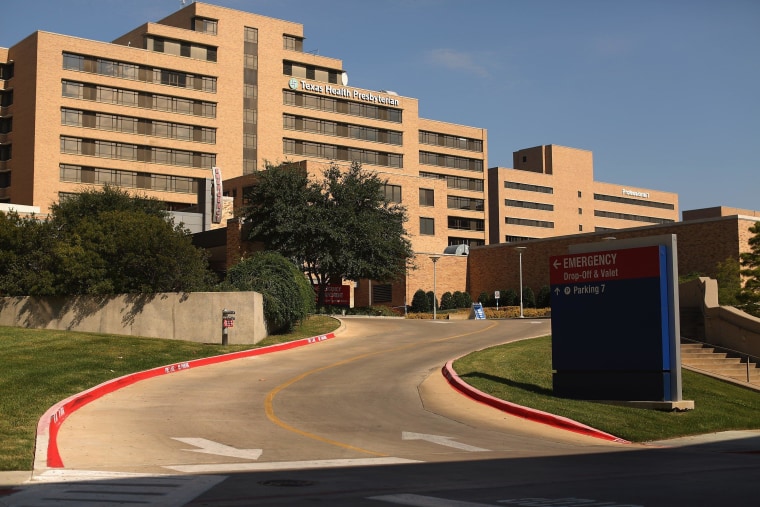The emergency room doctor who mistakenly sent home the first domestic Ebola patient says he believes Thomas Eric Duncan got “appropriate” care for what appeared to be a sinus infection.
The Dallas Morning News tracked down Dr. Joseph Howard Meier, the emergency room doctor who examined Duncan the first time he came into Texas Health Presbyterian Hospital Dallas for treatment. The hospital sent Duncan home after giving him Tylenol and a prescription for an antibiotic. Duncan came back two days later to be diagnosed with Ebola, and died from the virus.
Meier, interviewed in writing via a lawyer, told the newspaper he did his best based on the information he had at the time.
“Hindsight is always 20/20 so it’s virtually impossible to answer this question,” Meier is quoted by the newspaper as saying. “Based on the information I had at the time, I believe that the care and treatment were appropriate.”
“Based on the information I had at the time, I believe that the care and treatment were appropriate.”
The hospital has apologized to Duncan’s fiancée and reached an out-of-court settlement over the matter. The hospital has admitted its treatment fell short.
Many experts, including National Institute of Allergy and Infectious Diseases director Dr. Anthony Fauci, have said it was clearly a mistake to have sent Duncan home and say earlier care could potentially have saved his life.
Duncan, who had flown from Liberia on Sept. 20, started feeling ill on Sept. 24 and visited the emergency room at Texas Health Presbyterian on the night of the 25th. He was sent home and returned by ambulance on the 28th, extremely ill, and died Oct. 8. Two nurses who treated him, Nina Pham and Amber Vinson, became infected but have since recovered.
The Centers for Disease Control and Prevention had been warning U.S. hospitals for weeks to be on the lookout for Ebola in travelers from West Africa, where an epidemic was raging out of control. “I do remember receiving the CDC email at the beginning of August,” Meier said.
But he said it was not clear that Duncan had recently arrived from Liberia. He had a runny nose, a fever, headache and abdominal pain -- all symptoms of potentially hundreds of different infections.
Meier said he did not remember Duncan having mentioned specific travel from Liberia. The medical records indicate Duncan did tell a nurse he was from Africa but not from one of the three countries most affected by the Ebola epidemic.
“It can be a challenge to diagnose disease and illness,” said Meier, who was working the overnight shift on Sept 25-26.
“Since this first case, we have better protocols in place, but, even then, it can still be very difficult to diagnose something so rare,” he said. “We do the best we can to get it right based on our training and experience.”
Duncan is one of only two people to have inadvertently come to the U.S. while infected with Ebola. The other is Dr. Craig Spencer, who was treated and released from Bellevue Hospital in New York on Nov. 11 after working in Guinea.
CDC guidance has been updated and now makes clear that all patients with any potential symptoms of Ebola, including fever, headache, stomach pain, vomiting and diarrhea, should be asked specifically whether they have been in Liberia, Guinea, Sierra Leone and now Mali and whether they have been in contact with someone who could have had Ebola.
Anyone answering yes should be immediately isolated and treated as if they have Ebola until tests come back.
Meier initially declined to be interviewed, the newspaper said, and later provided answers in writing via his lawyer, L. Lin Wood, a high-profile specialist in First Amendment, libel and defamation cases.
“It’s very easy to make a diagnosis of any condition after the patient’s medical evaluation confirms the final diagnosis,” Meier wrote. “Unfortunately, such 20/20 hindsight is not available to medical professionals caring for patients in real time.”
“Unfortunately ... 20/20 hindsight is not available to medical professionals caring for patients in real time.”
Wood is best known for representing the parents of JonBenet Ramsey, the 6-year-old girl found murdered in the basement of her Colorado home in 1996, and Richard Jewell, the Atlanta security guard falsely accused of setting off a bomb at the 1996 Atlanta Olympics.
“As medical professionals we aspire to perfection in the diagnosis and treatment of all our patients and have regrets when an incorrect diagnosis occurs,” Meier wrote in his answers to the Dallas Morning News.
He said the whole case felt “a little bit like getting struck by lightning, but mild in comparison to what Mr. Duncan’s family has gone through in losing a loved one to Ebola.”
